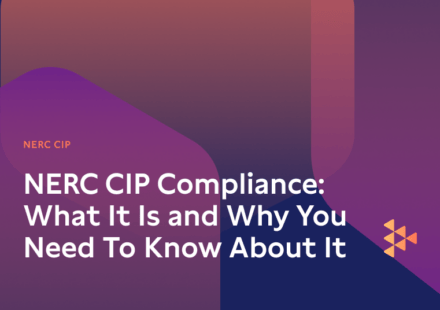NERC CIP (North American Electric Reliability Corporation Critical Infrastructure Protection) standards are a set of mandatory cybersecurity standards and requirements designed to safeguard the critical infrastructure of the North American power grid. These standards aim to ensure the reliability, security, and resilience of the electric grid by addressing various cybersecurity risks and vulnerabilities. In this blog post, we’ll be covering the following topics:
- Who needs to comply with NERC CIP, and why
- A breakdown of the NERC CIP requirements
- Penalties and fines for noncompliance with NERC CIP
- What to expect in a NERC CIP audit
Who Needs to Comply with NERC CIP?
Entities that operate, control, or interact with the bulk electric system (BES) in North America are required to comply with NERC CIP standards. This includes:
- Electric utilities and generation companies
- Transmission and distribution companies
- Regional transmission organizations (RTOs) and independent system operators (ISOs)
- Grid operators and control centers
- Entities with access to and responsibility for critical cyber assets (CCAs)
A Breakdown of NERC CIP Requirements
NERC CIP standards are organized into several versions, with each version consisting of multiple standards and requirements. NERC CIP standards are organized into several critical infrastructure protection requirements. The key requirements include:
| Number | Title | Status |
|---|---|---|
| CIP-002-5.1a | Cyber Security — BES Cyber System Categorization | Subject to Enforcement |
| CIP-003-8 | Cyber Security — Security Management Controls | Subject to Enforcement |
| CIP-003-9 | Cyber Security — Security Management Controls | Subject to Future Enforcement |
| CIP-004-6 | Cyber Security - Personnel & Training | Subject to Enforcement |
| CIP-004-7 | Cyber Security — Personnel & Training | Subject to Future Enforcement |
| CIP-005-7 | Cyber Security — Electronic Security Perimeter(s) | Subject to Enforcement |
| CIP-006-6 | Cyber Security - Physical Security of BES Cyber Systems | Subject to Enforcement |
| CIP-007-6 | Cyber Security - System Security Management | Subject to Enforcement |
| CIP-008-6 | Cyber Security — Incident Reporting and Response Planning | Subject to Enforcement |
| CIP-009-6 | Cyber Security - Recovery Plans for BES Cyber Systems | Subject to Enforcement |
| CIP-010-4 | Cyber Security — Configuration Change Management and Vulnerability Assessments | Subject to Enforcement |
| CIP-011-2 | Cyber Security - Information Protection | Subject to Enforcement |
| CIP-011-3 | Cyber Security - Information Protection | Subject to Future Enforcement |
| CIP-012-1 | Cyber Security – Communications between Control Centers | Subject to Enforcement |
| CIP-013-2 | Cyber Security - Supply Chain Risk Management | Subject to Enforcement |
| CIP-014-3 | Physical Security | Subject to Enforcement |
It’s important to note that NERC CIP standards can evolve and change over time, so organizations subject to these standards should refer to the most current version and any updates provided by NERC and FERC.
Who Enforces NERC CIP and What are the Penalties for Noncompliance?
FERC (Federal Energy Regulatory Commission) is responsible for enforcing compliance with NERC CIP standards. FERC can impose penalties and fines for violations of these standards. The fines can be substantial, and they serve as a deterrent to encourage compliance with the regulations.
NERC CIP compliance is monitored through audits, self-certifications, and spot checks. Violations of NERC CIP standards can result in significant fines and penalties for non-compliant entities. These fines can be substantial, potentially reaching millions of dollars per violation. NERC has the authority to enforce compliance and impose fines on entities that fail to adhere to the established cybersecurity standards. The severity of fines may vary depending on the nature and impact of the violation, with more severe violations incurring higher penalties. It is essential for organizations in the electric utility sector to take NERC CIP compliance seriously to avoid legal and financial consequences and to ensure the security and reliability of the electrical grid.
Enforcement actions by FERC can include:
- Monetary Penalties: Fines can be imposed for non-compliance, and the amount of the penalty depends on the severity and impact of the violation.
- Corrective Action Plans: FERC may require entities to develop and implement corrective action plans to address deficiencies and ensure future compliance.
- Audits and Investigations: FERC has the authority to conduct audits, investigations, and spot checks to assess compliance.
- Entities subject to NERC CIP standards must take compliance seriously to avoid these enforcement actions and the associated fines. Compliance audits and self-certifications are crucial to demonstrating adherence to the standards and avoiding regulatory penalties.
What to Expect in a NERC CIP Audit
NERC CIP (North American Electric Reliability Corporation Critical Infrastructure Protection) audits conducted by FERC (Federal Energy Regulatory Commission) can take place under various circumstances and on different schedules. Here are some common situations in which an NERC CIP audit by FERC might occur:
- FERC conducts routine audits of entities subject to NERC CIP standards to assess their compliance with the regulations. These audits are typically scheduled in advance and may occur on a periodic basis, such as every few years.
- FERC may initiate an audit in response to complaints or concerns raised about a particular entity’s compliance with NERC CIP standards. If stakeholders or whistleblowers report potential violations, FERC may investigate and conduct an audit as part of the investigative process.
- In the event of a significant cybersecurity incident or a breach that affects the bulk electric system (BES), FERC may conduct an audit to determine whether the affected entity was in compliance with NERC CIP standards leading up to the incident. This is done to assess the impact of non-compliance on the incident.
- Entities subject to NERC CIP standards are required to self-report any violations or incidents that may have a significant impact on BES reliability. If an entity self-reports violations, FERC may conduct an audit to verify the reported information and assess the entity’s overall compliance.
- FERC has the authority to perform spot checks and unannounced audits to assess compliance at any time. These spot checks can occur without prior notice to the audited entity.
- When there are significant changes or updates to NERC CIP standards, FERC may conduct audits to ensure that entities are adapting to and complying with the new requirements.
- If a prior audit identified compliance deficiencies or areas of concern, FERC may schedule follow-up audits to assess whether the entity has taken corrective actions to address those issues.
It’s essential for entities subject to NERC CIP standards to maintain ongoing compliance efforts, conduct internal assessments, and be prepared for potential audits by FERC. Being proactive about compliance, documenting processes and controls, and promptly addressing any identified deficiencies can help mitigate the risk of non-compliance and the associated consequences of FERC audits.
Leverage Carbide to Streamline Your NERC CIP Compliance Process
Navigating NERC CIP demands precise tools and expert guidance to ensure compliance, mitigate risks, and avoid the significant penalties of noncompliance. Integrating Carbide into your tech stack ensures your organization remains prepared for regulatory shifts, fostering a culture of continuous compliance. Carbide simplifies NERC CIP compliance by transforming complex compliance requirements into simple, manageable tasks. Contact our team today to learn how Carbide can revolutionize your approach to NERC CIP compliance and experience our solutions firsthand.

